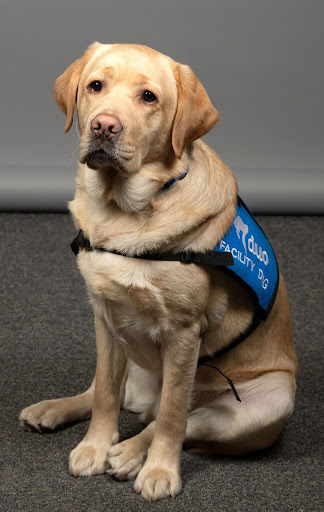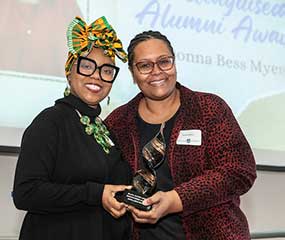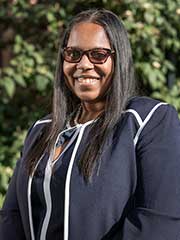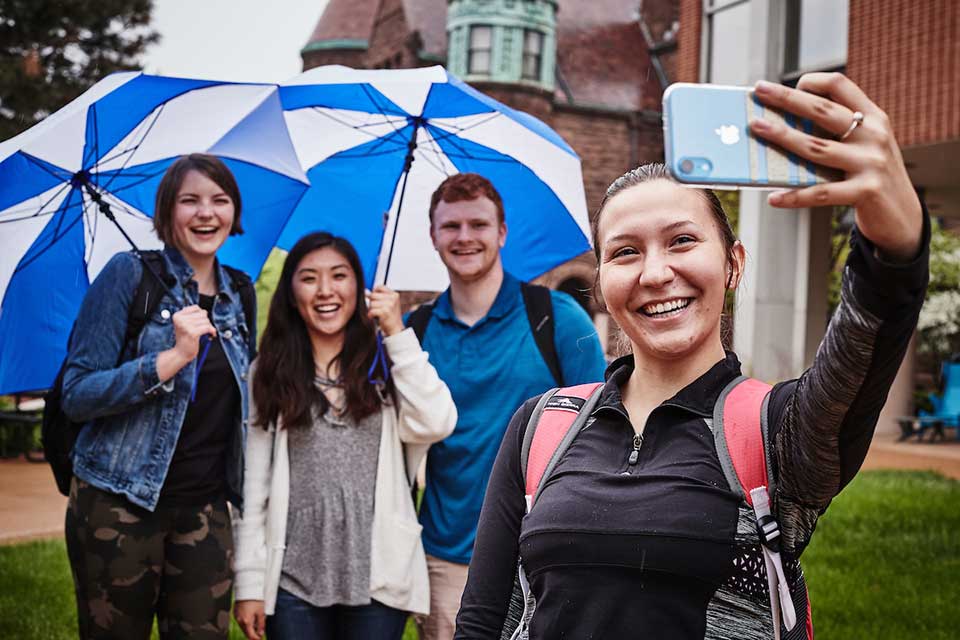Billiken Bulletin Newsletter
Welcome to spring, Billiken families. It looks like we are closer to warmer weather
and sunshine. As we prepare for Spring Break, this edition of Billiken Bulletin will
focus on navigating through mid-semester. We will also talk about how your student
can continue to move forward through their academic curriculum, including meeting
with their advisor, and delve into recommended solutions for dealing with roommate
conflict. Lastly, we will give you an inside look at our new Duo Facility Dog, Woody.
Also, look at our important calendar dates and events. Have a wonderful March!
It’s Not Too Late: Bouncing Back After Midterms
Submitted by Emily Tuttle, Student Success Coach and Interim Assistant Director of Academic Support
After the hustle of midterm week, spring break provides an opportunity for your student to pause and relax … and also reflect. What are they proud of so far this semester? What has gone well or made them happy? And where do they see room for improvement? While some students may want to concentrate on maintaining the strategies that are currently working for them, others may be looking for a new path forward. Here are some common challenges that students identify at this point in the semester and a few suggestions for approaching the second eight weeks.
Challenge 1
Your Student’s Midterm Grades Are Not Where They Want Them to Be
If your student is unhappy with one or more of their midterm grades, it’s not too late. Midterm grades are meant to help students assess how they’re doing in a class, and a low midterm grade does not necessarily translate to the same final grade. For most classes, there are a solid number of remaining assignments, papers and tests in the second half of the semester, which means there are a lot of points still at play and opportunities to bring their grade up. However, your student must recognize that they likely can’t keep doing what they’re doing and expect improvement.
Post-midterm grades, encourage your student to meet with their professor. Some students may feel anxious about this meeting, so reassure them that professors want to help students succeed. The professor can talk with your student about how the class has gone and what strategies and habits they can implement to hopefully see improved results. If your student struggles with the content in a class, it’s a good idea to make office hours a part of their routine; this will provide a consistent avenue for your student to get their questions answered and to gain clarity about the material. Tutoring and Supplemental Instruction, if available for the class, are also great resources that can help your student feel more confident in their coursework.
Challenge 2
Your Student Has Missed Assignments and/or Their Attendance Hasn’t Been Great
If your student has fallen into some bad habits – perhaps they have multiple missed assignments or they haven’t attended class as they should – it’s not too late. Returning from spring break allows for a bit of a fresh start, a chance to stay on track both in terms of coursework and attendance.
Again, it’s a good idea for your student to check in with the professor. What work have they missed, and can they still submit it, even for partial credit? Depending on the professor’s course policies, they may not be able to submit any missing or late work, but it never hurts to ask. It’s also important to devise a plan to keep up with assignments. Utilizing a planner, calendar or app to track due dates and implementing a study plan can assist students with organizing what coursework needs to get done and when. They can try sorting tasks into daily to-do lists or creating a schedule to hold themselves accountable for their coursework.
If attendance has been an issue, your student will want to identify the root cause. Are they oversleeping? Not enjoying the class? Using class time for other work or getting distracted? One way to help students remember to go to class – whether they need to wake up on time or put down other work or diversions – is to set a reminder on their phone or to enlist an accountability buddy. A class may not be your student’s favorite or they may not see the point in attending, however, attendance may count toward their final grade. Even if it doesn’t, being in class is a vital component in understanding the content, keeping up with announcements, and connecting with the professor and other classmates.
Challenge 3
Your Student Feels Burned Out
Many college students report feeling burnt out – exhausted, unmotivated, and unable to focus – especially toward the middle of the semester and as we move closer to final exams. Burnout can be a barrier to academic success, but more importantly, it impacts your student’s overall well-being. While spring break ideally provides time to relax and rest, your student needs to have strategies in place for when they return to campus to help them balance their academics alongside taking care of themselves physically and mentally.
In the busy schedule of a college student, it can be difficult to prioritize self-care. It seems counterintuitive, but making the time and space to stop, relax, take care of ourselves and do things we enjoy allows us to be more productive in the long run. Engaging in self-care means we’re allowing ourselves time to rest and reset, which means that when we return to tasks, we’re more motivated and focused – compared to when we try to push through and end up exhausted and unproductive.
Encourage your student to build self-care into their day. A simple way to start is to use the 30 minutes or hour before bed to unwind and destress, to do something for themselves. This might be a nighttime routine, prayer or meditation, something creative, reading, journaling, or any number of activities – as long as it’s not scrolling on their phones. Students can also visit the WellSPACE on the second floor of Wuller Hall. This space is open 8 a.m.-5 p.m., Monday through Friday, and features comfy seating, weighted blankets, and supplies and activities to provide a creative and stress-reducing outlet.
Reality Check
While midterms and spring break provide a respite and a chance to reflect and assess, in truth, sometimes that assessment means difficult conversations about the best path forward. As mentioned above, in many cases, it’s not too late to course-correct and get back on track for the remainder of the semester.
Sometimes, however, the most viable option might be to withdraw from a course. Your student’s grade may not be salvageable with the remaining points or they’ve lost too many points from lack of attendance. Maybe they don’t feel confident in the course content and are unsure if they can bring up their grade. Maybe they need to take an overwhelming course off their plate for the sake of their other courses and for their well-being.
If your student finds themselves in any of these situations, they should talk to their academic advisor to discuss their options in terms of withdrawing from a class. While this may not be the outcome that you or your student had hoped for, it provides a path forward that may ultimately be in the best interest of their academic success and their physical and mental health.
Whatever position your student is in post-midterms, there are resources on campus that can help them navigate challenges and end the semester on a strong note.
Considering a Scholarly Summer?
Submitted by Peggy Dotson, Assistant Provost for Academic Success

As spring approaches, many start looking ahead to summer's warm and sunny days. While it may not be the first thing on a student’s mind, the summer provides a great opportunity for students to move ahead with their degree plans or take electives that support personal interests and career goals.
When considering a summer course, we recommend students meet with their academic advisor and faculty mentor(s) to discuss course recommendations, curriculum implications, experiential learning, and the best course of action to develop a summer schedule.
If taking the class at SLU, students have multiple classes and sessions to choose from. Students register themselves at courses.slu.edu, and registration for summer 2024 opens March 20, 2024. Grades for these courses are included in the student’s SLU GPA, while courses taken elsewhere only transfer the credit, not the grade.
Taking a summer course at another institution requires pre-approval to ensure course transfer as anticipated. Students must complete this form and submit it to their advisor. Be sure to read the policies listed on the back of the form. Students planning to apply to medical school should also discuss these plans with their pre-health advisor (or email phpl@slu.edu), and international students must obtain approval from the Office of International Services.
Learning to Manage Conflict
From CollegiateParent.com
Billiken families, as the semester evolves, so do the relationships between your students and their roommates. Dynamics can shift and challenges can occur. In some instances, it can be difficult and cause stress. Below is a link to an article from Collegiate Parent offering supportive tools to help your student manage that conflict.
We also wanted to offer some recommendations you can share with your student for ways they can resolve roommate conflicts with the support of SLU Housing and Residence Life:
- Encourage them to meet with their roommate to review the living agreement.
- Contact their residence advisor to help moderate the conversation.
- If that doesn’t work, they can ask their resident advisor about other options and ask follow-up questions with the guidance they provide.
- For more information, please contact the Office of Housing and Residence Life.
Read the Entire Collegiate Parent article
SLU Welcomes Duo Dog Woody to Campus
Submitted by Tori Harwood, Wellness Coordinator
 The first Duo Facility Dog to ever go to college, Woody is an almost two-year-old
English labrador retriever who has been training his entire life for his new role.
The first Duo Facility Dog to ever go to college, Woody is an almost two-year-old
English labrador retriever who has been training his entire life for his new role.
In keeping with SLU’s holistic approach to mental health and well-being, Woody will assist with decreasing stress, improving moods and promoting overall well-being through interactions with students, faculty and staff on campus.
“SLU is dedicated to cura personalis, caring for the whole person, and this is just another example of that,” said Eric Anderson, assistant vice president of student well-being and one of Woody’s handlers. “In today’s world, young people are experiencing more stress than ever before, and that stress isn’t limited to just finals week. We wanted to provide students with an opportunity to have resources year-round, and Woody provides a safe, new and fun outlet to de-stress and really help improve mental health across SLU’s campus.”
A facility dog is similar to a service dog, but they have some distinct differences. A facility dog undergoes similar training as service dogs but is specifically trained to work with multiple handlers in residential homes, clinics or organizations and carry out specific, skilled tasks with multiple clients. Facility dogs also do not have public access rights and are only authorized to work within the assigned facility.
Staff from the Division of Student Development, the Department of Campus Recreation and Wellness, the University Counseling Center, and other areas will escort Woody around campus. These handlers have also received extensive training, both with and without Woody, to ensure the campus receives the best care possible from him.
“I am fully prepared to be stopped on every walk and to be late to every meeting,” said Tori Harwood, student wellness coordinator and Woody’s primary handler. “Woody is just so happy to be on campus. He’s already met with students and has become accustomed to his new office. And you can tell the spirits are lifted in those spaces. I’m really excited for this semester because I know he’s going to be the most popular figure on campus and will really do some good this year.”
Frequently Asked Questions About Woody
Woody is a two-year-old yellow English labrador retriever. His handlers include:
- Tori Harwood, Primary Handler (Campus Recreation & Wellness)
- Rebecca Weiser, Secondary Handler (University Counseling Center)
- Matt Davis, Secondary Handler (Provost Office)
- Eric Anderson, Secondary Handler (Student Development)
Woody will assist with decreasing stress, improving moods, and promoting overall well-being through interactions with our students, faculty, and staff on campus. We like to think of Woody as an employee who comes to serve our community daily.
SLU partnered with Duo Dogs to have a facility dog on campus in alignment with our broader mental health and well-being efforts. Woody will:
- Provide courage and comfort in uncomfortable situations or spaces
- Increase self-confidence and self-esteem
- Assist in overcoming emotional barriers and re-establish trust
- Decrease stress and overwhelming anxiety
According to Assistance Dogs International, Inc., the accreditation that certifies all of DuoDogs, Inc. canines:
Service dogs help individuals with disabilities. They undergo rigorous training to perform specific duties related to the individual's diagnosed disability. They are trained for tasks such as pulling a wheelchair, bracing, retrieving, alerting or helping with a medical crisis. Service dogs are also trained to perform tasks for other conditions including autism, PTSD, epilepsy or diabetes.
Facility dogs undergo similar training to service dogs but are specifically trained to work with handlers in residential homes, clinics or organizations. They carry out specific, skilled tasks with multiple clients and must be more than simply a presence in the facility. The handler must be trained by an ADI member. The facility dog is authorized to work within the assigned facility only. Facility dogs do not have public access rights and do not fall under the protection of the Americans with Disabilities Act.
Therapy dogs are usually in-home pets that can be trained to provide comfort and affection to people other than their owners. This is usually on a volunteer basis when the dogs and their owners visit schools, hospitals or other public places. Therapy dogs are temporary visitors and do not have a constant presence at a facility.
Emotional support animals provide companionship, relieve loneliness and sometimes help with depression, anxiety and certain phobias, but do not have special training to perform tasks that assist people with disabilities. Emotional support animals do not have public access and are not supported for public access from the Americans for Disability Act (ADA).
Woody is allowed in all facilities on campus except lactation rooms, food preparation areas, serving and dining areas, SLU vans, shuttles, mechanical rooms, kitchen areas, and the data centers (located in Des Peres Hall, Doisy Research Center, and the Caroline Building).
As a facility dog, Woody has had extensive training to reduce stress and increase positive well-being when interacting with individuals. He also trains daily and is recertified every year to maintain certification status. There are specific policies in place that allow Woody to engage with the SLU community and to ensure everyone stays safe.
Requests are limited at this time as Woody is still onboarding to his new role. That being said, the SLU community will not be able to request Woody to hang out while studying or while in their residential hall. There will be many events and opportunities for the campus community to interact and engage with Woody on a regular basis.
If you would like to pet Woody, just let his handlers know at that time. Woody really loves people, so he will come up to you after permission is given and smell your legs or feet. Woody really enjoys pets on his back and sometimes belly rubs! He just asks that people don’t hover over him or get face-to-face with him during interactions.
No. Woody is on a strict diet and enrichment schedule. Only his handlers are allowed to give him treats while training or his dog food.
No, Woody is a working animal supporting our campus community. Our handlers will not allow nose-to-nose interaction with other dogs.
Woody is a yellow English labrador retriever and is not hypoallergenic. Please let our handler know if you are allergic to dogs so that we can maintain appropriate space and distance. Individuals are not required to interact with Woody. Each handler has a space in their office for him and alternative meeting locations can be accommodated for individuals with allergies.
Duo Facility Dog Woody has been specially trained to work with individuals and must always be on leash when interacting with people. Please let our handler know if you are uncomfortable around dogs so that we can maintain appropriate distance. Of course, individuals are not required to interact with Woody.
No, Woody lives with his primary handler, Tori, and travels with them to SLU Monday-Friday, and leaves at the end of the day to return home.
Woody is expected to work up to around 10 years old, unless any unforeseen circumstances or health ailments arise that wouldn’t allow him to continue his work.
I love getting pets, bringing joy and smiles to faces, and I love my job!
Announcements
Recognitions
We would like to recognize two staff members who have been instrumental to the Office of Student Development and the success of students.

Donna Bess Myers has been with SLU for 25 years in different capacities, most recently as the dean of students. Her new role is the senior advisor to the vice president for student involvement, Sarah Cunningham, Ed.D. She co-chairs the Mission Priority Examen Committee. Bess Myers recently received the SLU 2023 Distinguished Alumni Award at the 2024 SLU Black Alumni Association Prayer Breakfast and was also recognized at this year's Black Excellence Gala sponsored by DICE (Division of Diversity and Innovative Community Engagement) for her service and contributions.
 After seven years, Manisha Ford Thomas, Ph.D., has stepped down as director for housing
and residence life. As the director, she oversaw the vision and execution of housing
initiatives and providing an inclusive on-campus housing community for students. Ford-Thomas'
leadership was instrumental during the challenging times of COVID-19. Her undying
support, passion, and consistency for students were always demonstrated and appreciated.
She is also known for her great rapport and care for students and colleagues.
After seven years, Manisha Ford Thomas, Ph.D., has stepped down as director for housing
and residence life. As the director, she oversaw the vision and execution of housing
initiatives and providing an inclusive on-campus housing community for students. Ford-Thomas'
leadership was instrumental during the challenging times of COVID-19. Her undying
support, passion, and consistency for students were always demonstrated and appreciated.
She is also known for her great rapport and care for students and colleagues.
We would like to congratulate both on their achievements and commitment to SLU and appreciate all their contributions. We wish them continued success in their future endeavors.
BPFA Trivia Night
 The Saint Louis University Billiken Parent and Family Association will host its 15th
Annual Family Trivia Night and Silent Auction from 6-10 p.m. on Saturday, April 13,
in the Saint Louis Room ballroom on the third floor of the Busch Student Center. In-person
and virtual options are available. The cost is $200 per table or $25 per person (up
to eight players a table). Beer and wine will be available for purchase. Soda and
water will be provided. Participants will also have the opportunity to win prizes.
The Saint Louis University Billiken Parent and Family Association will host its 15th
Annual Family Trivia Night and Silent Auction from 6-10 p.m. on Saturday, April 13,
in the Saint Louis Room ballroom on the third floor of the Busch Student Center. In-person
and virtual options are available. The cost is $200 per table or $25 per person (up
to eight players a table). Beer and wine will be available for purchase. Soda and
water will be provided. Participants will also have the opportunity to win prizes.
Volunteer to Help with Trivia Night
This year's proceeds will raise money to assist the Billiken Parent and Family Association in its initiatives to support mental health and well-being, food security and fostering a welcoming environment for all students. If you are interested in providing donations for the auction, please send those to:
BPFA Trivia, Saint Louis University
Busch Student Center 20 North Grand Blvd., Suite 356
St. Louis, MO 63103.
The donation deadline is March 22, 2024.
University Counseling Center Weekly Groups
Mondays
Alone Together Social Club (w/Duo Dog Woody)
Wuller Hall, 2nd Floor, Wellspace: 5-7 p.m.
Tuesdays
Rollercoaster of Love Relationship Support Group
Wuller Hall, Dorothy Day Room: 3-4 p.m.
Sober@SLU
Wuller Hall 227, 5-6 p.m.
No Shame in Our Game Men's Support Group
Wuller Hall 224, 3-4 p.m.
Wednesdays
Shades Support for Women of Color
Wuller Hall 224, 3-4 p.m.
For more information, contact 314-977-8255
Get to Know SLU’s Unique Terminology
Flex Points
Usually referred to as flex dollars or just “flex,” these come from DineSLU meal plans and can be used to purchase food at on-campus eateries such as Qdoba Mexican Grill, Subway and other on-campus dining locations. Students can also use their flex dollars at SLU's on-campus Starbucks.
Saint Louis University adopted the Billiken as its mascot in 1910, created by Missouri art teacher and illustrator Florence Pretz. It is said to resemble SLU’s then-football coach, John Bender!
Important Calendar Dates
Housing Calendar Dates
- March 10: The priority deadline for rising sophomore contracts
- March 22: Rising sophomore assignments released at 10 a.m.
Other SLU Events
- March 1: First Generation Day
- March 6: What’s the Scoop at SLU: Career Services Webinar
- March 9-16: Residence Halls Close at 10 a.m. for Spring Break
- March 10: Daylight Savings Time Begins
- March 10: Ramadan Begins
- March 11-16: Spring Break, No Classes, Spring Break Immersion Trips
- March 19: First Day of Spring
- March 20: Virtual Career Expo
- March 23: Purim Begins
- March 28-April 1: Easter Break, No Classes
- March 29: Good Friday
- April 3: Seniors (90+ earned credits) - Fall 2024 Registration Opens
- April 9: Juniors (60+ earned credits) - Fall 2024 Registration Opens
- April 17: SLU-Madrid Opens Registration for Fall 2024
- April 19: Sophomores (30+ earned credits) - Fall 2024 Registration Opens
- April 26: Freshmen (fewer than 30 earned credits) - Fall 2024 Registration Opens
Additional University Resources
2023-24 Student Handbook for all SLU Students


















